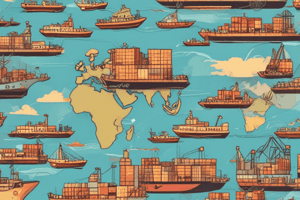Podcast
Questions and Answers
What is the main goal of Trade Facilitation?
What is the main goal of Trade Facilitation?
- To promote trade only between neighboring countries
- To reduce the time and cost of trading across borders (correct)
- To create a new regulatory framework for international trade
- To increase the number of customs inspections
Which of the following is NOT a key initiative of the World Customs Organisation (WCO) in promoting trade facilitation?
Which of the following is NOT a key initiative of the World Customs Organisation (WCO) in promoting trade facilitation?
- WCO Data Model
- Revised Kyoto Convention (RKC)
- Single Window
- General Agreement on Tariffs and Trade (GATT) (correct)
What is the primary benefit of the Authorized Economic Operator (AEO) program?
What is the primary benefit of the Authorized Economic Operator (AEO) program?
- Reduced trade volumes
- Increased customs inspections
- Higher costs associated with customs procedures
- Benefits such as reduced inspections and faster clearance times (correct)
What is the result of simplified and streamlined customs procedures on trade transactions?
What is the result of simplified and streamlined customs procedures on trade transactions?
What is the expected outcome of trade facilitation on economic growth?
What is the expected outcome of trade facilitation on economic growth?
Flashcards are hidden until you start studying
Study Notes
Trade Facilitation
Definition
- Trade Facilitation refers to the simplification and streamlining of customs procedures to reduce the time and cost of trading across borders.
- It aims to increase the speed, efficiency, and predictability of the movement of goods, while maintaining the necessary controls and security.
WCO's Role in Trade Facilitation
- The World Customs Organisation (WCO) plays a key role in promoting trade facilitation through its various instruments and tools.
- The WCO provides a framework for countries to simplify and harmonize their customs procedures, reducing the complexity and costs associated with international trade.
Key Initiatives
- Revised Kyoto Convention (RKC): A comprehensive framework for customs procedures, providing a set of standards and guidelines for simplifying and harmonizing customs procedures.
- WCO Data Model: A standardized framework for the exchange of customs data, enabling efficient and accurate processing of trade transactions.
- Single Window: A single, electronic platform for submitting and processing trade-related information, reducing the need for multiple submissions and improving the speed and efficiency of trade transactions.
- Authorized Economic Operator (AEO): A program recognizing reliable and secure traders, providing them with benefits such as reduced inspections and faster clearance times.
Benefits of Trade Facilitation
- Increased Efficiency: Reduced processing times and improved predictability of trade transactions.
- Reduced Costs: Lower costs associated with customs procedures, documentation, and clearance.
- Improved Competitiveness: Enhanced competitiveness for businesses, particularly small and medium-sized enterprises (SMEs).
- Increased Trade Volumes: Simplified and streamlined customs procedures can lead to increased trade volumes and economic growth.
Challenges and Opportunities
- Implementation Challenges: Countries may face difficulties in implementing trade facilitation measures, including inadequate infrastructure, limited resources, and lack of technical expertise.
- Digitalization: The increasing use of digital technologies presents opportunities for further simplification and automation of customs procedures.
- Regional and Global Cooperation: Trade facilitation initiatives can be strengthened through regional and global cooperation, promoting a harmonized approach to customs procedures.
Trade Facilitation
Definition
- Trade facilitation aims to simplify and streamline customs procedures to reduce time and cost of trading across borders.
- It aims to increase speed, efficiency, and predictability of goods movement while maintaining necessary controls and security.
WCO's Role in Trade Facilitation
- The World Customs Organisation (WCO) promotes trade facilitation through its instruments and tools.
- WCO provides a framework for countries to simplify and harmonize customs procedures, reducing complexity and costs associated with international trade.
Key Initiatives
- Revised Kyoto Convention (RKC) is a comprehensive framework for customs procedures, providing standards and guidelines for simplifying and harmonizing customs procedures.
- WCO Data Model is a standardized framework for exchanging customs data, enabling efficient and accurate processing of trade transactions.
- Single Window is a single, electronic platform for submitting and processing trade-related information, reducing the need for multiple submissions and improving speed and efficiency of trade transactions.
- Authorized Economic Operator (AEO) program recognizes reliable and secure traders, providing benefits such as reduced inspections and faster clearance times.
Benefits of Trade Facilitation
- Increased efficiency: reduced processing times and improved predictability of trade transactions.
- Reduced costs: lower costs associated with customs procedures, documentation, and clearance.
- Improved competitiveness: enhanced competitiveness for businesses, particularly small and medium-sized enterprises (SMEs).
- Increased trade volumes: simplified and streamlined customs procedures can lead to increased trade volumes and economic growth.
Challenges and Opportunities
- Implementation challenges: countries may face difficulties in implementing trade facilitation measures, including inadequate infrastructure, limited resources, and lack of technical expertise.
- Digitalization: increasing use of digital technologies presents opportunities for further simplification and automation of customs procedures.
- Regional and global cooperation: trade facilitation initiatives can be strengthened through regional and global cooperation, promoting a harmonized approach to customs procedures.
Studying That Suits You
Use AI to generate personalized quizzes and flashcards to suit your learning preferences.




